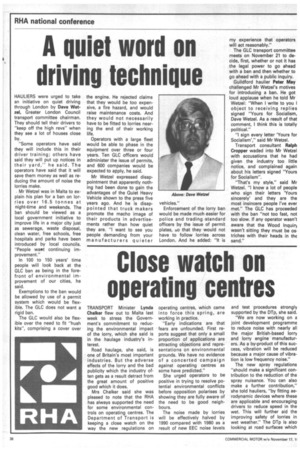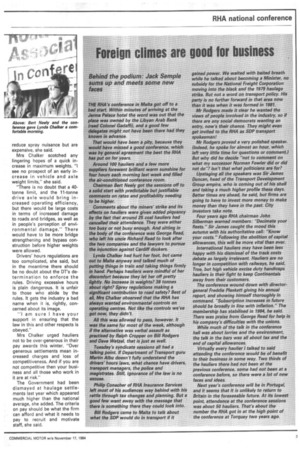Close watch on operating centres
Page 40

Page 41

If you've noticed an error in this article please click here to report it so we can fix it.
TRANSPORT Minister Lynda Chalker flew out to Malta last week to stress the Government's commitment to reducing the environmental impact of the lorry, which she said is in the haulage industry's interest.
Road haulage, she said, is one of Britain's most important industries. But the adverse effects of the lorry and the bad publicity which the industry often gets as a result detract from the great amount of positive good which it does.
Mrs Chalker said she was pleased to note that the RHA has always supported the need for some environmental controls on operating centres. The Department of Transport is keeping a close watch on the way the new regulations on operating centres, which came into force this spring, are working in practice, "Early indications are that fears are unfounded. First reports suggest that only a small proportion of applications are attracting objections and representations on environmental grounds. We have no evidence of a concerted campaign against operating centres as some have predicted." She urged operators to be positive in trying to resolve potential environmental conflicts before opposition polarises by showing they are fully aware of the need to be good neighbours.
The noise made by lorries will be effectively halved by 1990 compared with 1980 as a result of new EEC noise levels and test procedures strongly supported by the DTp, she said.
"We are now working on a joint development programme to reduce noise with nearly all the major British-based lorry and lorry engine manufacturers. As a by-product of this success, vibration will be reduced because a major cause of vibration is low frequency noise."
The new spray regulations "should make a significant contribution to the reduction of the spray nuisance. You can also make a further contribution," she told hauliers, "by fitting aerodynamic devices where these are applicable and encouraging drivers to reduce speed in the wet. This will further aid the improving safety of lorries in wet weather." The DTp is also looking at road surfaces which
reduce spray nuisance but are expensive, she said.
Mrs Chalker scotched any lingering hopes of a quick increase in maximum weights. "I see no prospect of an early increase in vehicle and axle weight limits," she said.
"There is no doubt that a 40tonne limit, and the 11-tonne drive axle would bring increased operating efficiency, but there would be large costs in terms of increased damage to roads and bridges, as well as in people's perception of environmental damage." There would have to be more bridge strengthening and bypass construction before higher weights were allowed.
Drivers' hours regulations are too complicated, she said, but in the meantime there should be no doubt about the DT's determination to enforce the rules. Driving excessive hours is plain dangerous. It is unfair to those who abide by the rules. It gets the industry a bad name when it is, rightly, concerned about its image.
"I am sure I have your support in ensuring that the law in this and other respects is obeyed."
Mrs Chalker urged hauliers not to be over-generous in their pay awards this winter. "Over generous settlements mean increased charges and loss of competitiveness. And if you are not competitive then your business and all those who work in it are at risk."
The Government had been dismayed at haulage settlements last year which appeared much higher than the national average, she added. The criteria on pay should be what the firm can afford and what it needs to pay to recruit and motivate staff, she said.












































































































